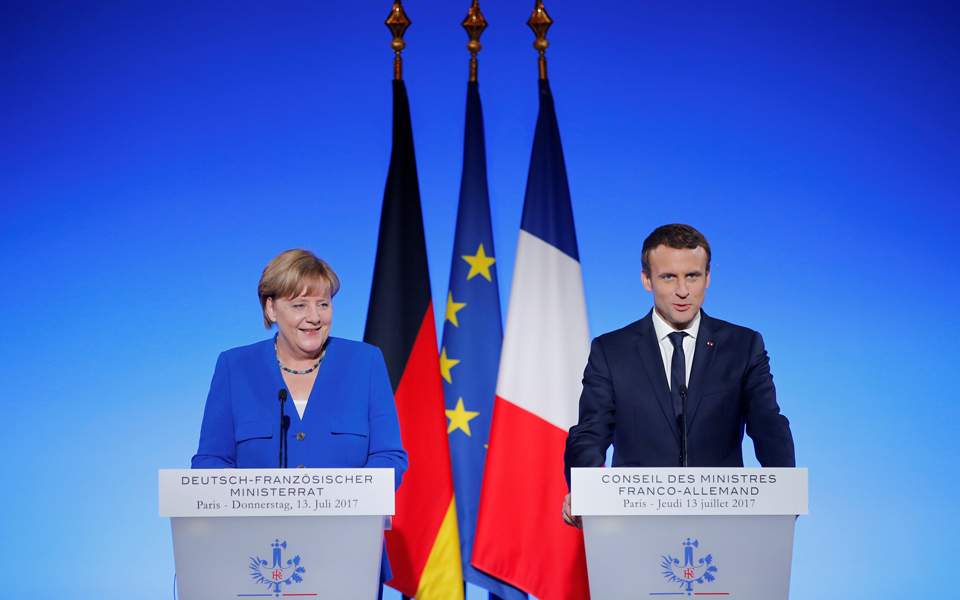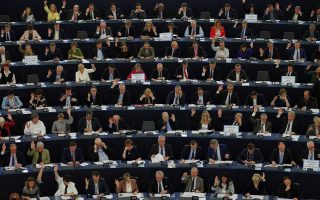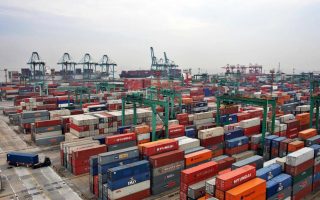Merkel, Macron slam door in face of Europeans between Aegean and Adriatic

It is 15 years since the EU took in eight new European nations all formerly occupied by the Red Army and in effect colonies of the former Soviet imperium. Of all the enlargements of the European Community, now Union, since the first one in 1973 to take in Britain, Denmark and Ireland, the transformation of the eight central and east European states is without historical precedent.
In little more than a decade they have left behind not just the decades of Soviet colonization but also broken decisively with a pre-1939 heritage of nationalism, clericalism, anti-Semitism and endemic poverty that drove millions to emigrate to West Europe, North America or Australia.
Visit any major city in Poland, the Czech Republic, the Baltic states or Slovakia and you see modern European streets, buildings, offices with every European firm, bank or other business highly visible alongside new Polish, Czech or Baltic startups.
The people, especially the young citizens, look bright, well-dressed and active in the business, cultural, social spheres, as well as enjoying the same rights of all Europeans in terms of gender, faith (or no faith) and sexuality. Certainly some head West but the cash of western Europe heads East to build roads, utility systems, open universities, move back offices from the City or Frankfurt or to make Slovakia one of the world centers of modern automobile production.
Not every government is perfect but the same can be said about plenty of old EU governments where corruption, politics interfering in the media or business decisions and backhanders to national and local politicians in countries like Italy, France or Spain have helped bring down governments and end political careers.
English nationalist xenophobes may have won their Brexit vote by denouncing the presence of hard-working new European Union citizens but the latter pay more taxes than any other group in Britain, fill up empty churches, marry English boys and girls, and add to the variety of the four nations in the UK plus its global megalopolis, London.
The osmotic power of the European Union to enrich and transform poorer European nations has never been more clear. It is a win-win process as established European firms have found new outlets for investment and profit in East Europe.
So it is all the more bizarre that the leaders of today’s EU have suddenly shut the door on a modest extension of Europe to include some small European nations with a combined population of 19 million who were hoping for the same beneficial transformatory process as the Baltic state or the two countries that emerged from Czechoslovakia in the 1990s.
In Berlin this week the leaders of Germany and France in a foolish, short-sighted move announced that the western Balkan ambitions for Europe would be rejected for at least another 5-10 years. Why are Emmanuel Macron and Angela Merkel playing into Vladimir Putin’s hands by denying any perspective of a European future to six small European countries located between the Aegean and the Adriatic?
The move is extremely damaging to Greece, which would be the main beneficiary of EU investment in its northern neighbors as well as a general economic and political integration of all the western Balkan states into the EU.
Each country’s hopes to become a small EU member state and get the same benefits as those that joined the EU 15 years ago should be treated on its merits.
Skopje has made heroic efforts with Athens to solve its name problem. Albania under Edi Rama is moving forwards steadily. Twenty years after European democracies intervened to stop massacres and ethnic cleansing in Kosovo and an uneasy peace fell after Slobodan Milosevic’s decade of war and terror in the region, Kosovo is still being punished because Serbia cannot accept that like Greece after Ottoman rule Kosovo is now an independent nation.
It has been a central Kremlin foreign policy goal this century to prevent the western Balkans from stabilizing into poor but normal European states. Russia has constantly meddled to prevent any final settlement between North Macedonia and Greece, which expelled Russian diplomats for trying to undermine the name change deal.
French President Macron acknowledged in 2017, when he had a vision for Europe, that “the EU will have to open itself up to the Balkan countries, because our EU is still attractive and its aura is a key factor of peace and stability on our continent.”
Now Macron has changed policy 180 degrees. The assumption is that he does not want to give any ammunition to Marine Le Pen, who will denounce the fact that three of the nations – Albania, Kosovo and North Macedonia – have European Muslim populations. But there are more Muslims in France and Germany than all of the Balkans, and President Macron and Chancellor Merkel should not allow their EU policy to be dictated by Islamaphobes like Marine Le Pen or the AfD in Germany.
What Macron and Merkel have done is to deny 19 million Europeans any hope. And without hope the worst always rises to the surface. Serbia may choose to be a new Kremlin satellite in southeast Europe but there is no need to punish North Macedonia, Albania, tiny Montenegro or Kosovo. At the very least, as the European Stability Initiative recommended this week, the EU should allow visa-free travel for Kosovars and support Kosovo’s entry into the Council of Europe. Greece could help by recognizing Kosovo, as could Spain, Romania and Slovakia.
Waiting for the Balkans countries to become Sweden or Switzerland is not serious politics. It is the first time that Europe has slammed the door shut on poor European nations and denied them the chance to grow. Many in the region will draw the obvious conclusion that if Europe won’t come to them they will go North and West to Europe. And Greece will not have roads running from the Aegean to the Alps to create investment and jobs in the Greek economy.
Denis MacShane was the UK’s minister for the Balkans 2001-2005, and travels and writes on the region.





